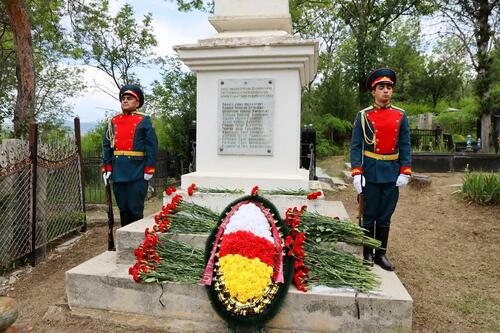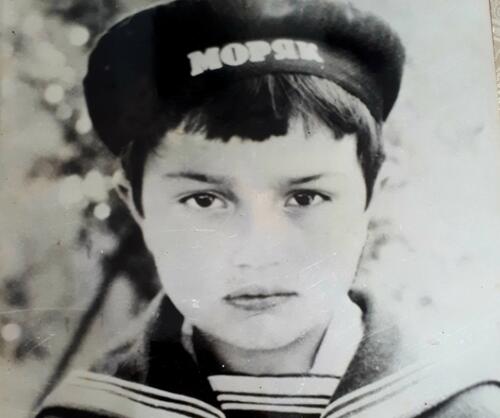The events of 1920 in South Ossetia, which had the most negative consequences for the Ossetians, should certainly be recognized by the international community as the fact of the targeted extermination of people on ethnic grounds by the Georgian government, and the organizers and perpetrators of these crimes should and will be punished, regardless of the statute of limitations, stated on Friday the State Security Committee of the Republic.
On June 20, 2020, Ossetia will mark the Day of Remembrance of the Victims of the Ossetian Genocide by the “Georgian Democratic Republic”.
"The State Security Committee of South Ossetia, in the framework of its activities, has been collecting and studying materials related to the Georgian government’s policy of state terrorism and targeted destruction of the population of the Republic of South Ossetia on ethnic basis in 1920, 1989-1992, and 2004-2008. The KGB is confident that just retribution will overtake the criminals, just as it overtook dozens of years after many Nazis who committed crimes against humanity during the Great Patriotic War, "the statement said.
As noted in the statement, 100 years have passed since the tragic events when the Georgian government sent troops of the regular army to exterminate the civilian population of South Ossetia.
“As a result of the punitive operation, more than 5 thousand ethnic Ossetians were killed, tens of thousands became refugees in North Ossetia, thousands of people died from hunger and cold at high mountain passes. Genocide is one of the gravest crimes against humanity. Nevertheless, it is an unprecedented crime of cruelty A hundred years ago, committed by the Georgian authorities against ethnic Ossetians, it was hushed up throughout the Soviet period, although Georgia continues to try to distort history in order to avoid responsibility for the deed, however, there are irrefutable facts, evidence of many eyewitnesses, official documents, archival materials , correspondence of historical figures, including Georgians, numerous historical studies, works of art by Ossetian classics based on real events that cannot be hidden, ”the authors of the text note.
The Committee reminded the words of Russian President V.V. Putin: “It would be good for today's Georgian authorities to know all this and not forget about it,” because “this is exactly what is called genocide today.”
"After the collapse of the Russian Empire in 1917, the revolutionary movement swept over South Ossetia, which had been part of Russia since 1774. Georgia joined Russia after Ossetia in 1801, fleeing Persian and Turkish rule. Russia showed favor to the Georgian nobility in the newly formed provinces, which had the worst effect on the situation of the Ossetian population. . The political disempowerment of an entire nation, oppressed by Georgian feudal lords with the support of the tsarist administration, led to increased protests and the formation of a rebel movement in South Ossetia that required self-determination, the statement said. - Soviet power in Russia, proclaimed as a result of the socialist revolution, gave the peoples of the former Russian Empire the right to self-determination. The leaders of the national movement sought to unite the 100,000th population of South Ossetia into one national-territorial autonomy, like all the Caucasian peoples, who had already begun the process of state-building. In Georgia itself, the National Council, supported by Western countries, was leading the former Russian province to another goal - independence from Russia. In 1918, the Georgian Democratic Republic was proclaimed. South Ossetia was in no way connected with this fact, neither legally, nor territorially, in the political processes of the newly emerging “democratic” country, and, led by the Ossetian National Council, sought to exercise the right to self-determination. The response to the Ossetian self-will was punitive actions of the Georgian government, aimed at the physical elimination of the problem - the destruction of the rebellious people. "
The Committee has noted that the first attack on the rebels on May 25, 1920 was repelled, the main forces of the Georgian invaders were defeated in the village of Dzau: "By the evening of June 7, the remnants of the punitive detachments were also driven out of Tskhinval. On June 8 at a mass rally in the liberated capital, the Revolutionary Committee proclaimed Soviet power and announced its accession to Soviet Russia, giving a clear rebuff to the claims of the Georgian authorities on the territory of South Ossetia.
Immediately after this, the Menshevik nationalist government of Georgia gave an order to launch a large-scale armed invasion of South Ossetia. On June 12, 1920, punitive detachments of the Georgian guard broke into Tskhinval, killing people in their homes with entire families and on the streets of the city, sparing neither children nor women
Almost all Ossetian villages from Tskhinval to the village of Ruck were burned. The few survivors retreated to the mountains. Tens of thousands of Ossetians were forced to flee. Evidence of the atrocities of the punishers is also observed by the organizers of the genocide themselves, in particular, the Chief of Staff of the Georgian National Guard, Valiko Dzhugeli, who, contemplating the heartbreaking pictures of the tragedy of an entire nation, reported his aesthetic feelings in his diary: “Ossetian villages are burning everywhere around us ... We will be cruel. Yes, we will. "With a calm soul and a clear conscience, I look at the ashes and puffs of smoke ... I am completely calm."
The intelligence service emphasizes that on June 20, Georgian guards shot and killed the entire political leadership of South Ossetia - 13 Communards captured in Tskhinval.
"The entire punitive action was aimed at the destruction of Ossetians on ethnic grounds, expelling them from their ancestral territories. The barbaric cruelty of punishers, robberies, violence, seizure of property, burnt villages and crops, all this aimed to sow panic among the local population, so that it would leave forever the borders of South Ossetia. "The Georgian Republic expelled the South Ossetians and will drive them further to the socialist paradise where they aspired. How can we leave the people to be destroyed on our land! ", The Georgian newspaper Ertoba wrote. As a result of the actions of Georgian troops in South Ossetia, more than 5 thousand people were killed, of which about 2 thousand were children. Tens of thousands of Ossetians became refugees. In order to save their lives, they were forced to leave South Ossetia, moving north through high mountain passes, where many found painful death on dangerous paths from cold, hunger and disease. Thousands of houses and buildings were burned, tens of thousands of cattle were stolen, "Georgians from neighboring regions of Georgia moved to Ossetian places of residence. These losses are irreplaceable for the small Ossetian people," the text says.
With the rout of the Menshevik government of Georgia, the statement noted, in March 1921, Soviet power was restored in South Ossetia.
"The Bolshevik leadership, which was heavily influenced by pro-Georgian representatives, included South Ossetia, which had barely survived the terrible events of genocide, as a part of the Georgian Socialist Republic as an autonomous region. Soviet Georgia tried by all means not to publicize the evidence of crimes against civilians committed by Georgian nationalists However, with the intensification of the processes leading to the collapse of the Soviet Union in the late 1980s, revanchist sentiments in Georgia were rejuvenated, nationalist slogans of the beginning of the 20th century returned, calls for punitive campaigns against the Ossetians with the goal of “cleansing” Georgian land from a foreign element ” Time has shown that Georgian politicians do not learn from the mistakes of their predecessors. Numerous crimes against humanity committed again by the Georgian leadership against the people of South Ossetia in 1989-1992, 2004 and 2008 during repeated armed aggression, confirmed their ethnic orientation. This is an objective historical truth, which no one will be able to hide, and it should be the subject of wide international discussion, "the document says.
The KGB has stated, that according to international law, the extermination of certain groups of the population on racial, national, ethnic or religious grounds is considered one of the gravest crimes against humanity and qualifies as genocide.






